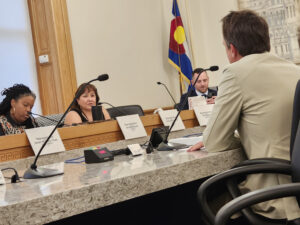Businesses facing lawsuits on subjects ranging from intellectual-property claims to antitrust violations may be facing down a plaintiff who is being funded by a deep-pocketed foreign entity. But they would have no way of knowing that — at least, potentially, until now.
In one of the oddest political teamings of this legislative session, the Colorado Chamber of Commerce and Colorado Trial Lawyers Association are pushing a bill to require foreign third-party litigation funders to disclose their agreements to the Colorado Attorney General. House Bill 1329, sponsored by the equally unusual pairing of Democratic Rep. Javier Mabrey of Denver and Republican Rep. Matt Soper of Delta, received unanimous support from the House Judiciary Committee at its first hearing on Tuesday night.
Third-party litigation funding is a growing field — estimated as a multibillion-dollar worldwide industry — in which hedge funds and other financiers will foot the bills for high-dollar lawsuits in exchange for getting a sometimes-substantial percentage of the award. The practice is raising concerns for groups like the U.S. Chamber of Commerce, which argues that the presence of investors looking to maximize judgments will work against reasonable settlements and usurp the desire of plaintiffs who may not know of their roles.
Observers have raised red flags even higher over the past year with the revelation that some of these investors in U.S.-based litigation are foreign actors looking to make money or grab intellectual property through discovery processes that can involve trade secrets. Bloomberg Law reported last year that one such litigation financier had ties to Russian leader Vladimir Putin and that another set of intellectual-property suits against Samsung Electronics Co. was funded by a Chinese firm that provides patent solutions.
What the bill would require of foreign funders

Colorado state Reps. Javier Mabrey and Matt Soper explain their bill on foreign third-party litigation funding to the House Judiciary Committee on Tuesday.
HB 1329 doesn’t bar foreign funding of lawsuits in Colorado courts, but it requires funders to disclose their existence to the AG’s office within 35 days of the execution of the litigation financing agreement and to submit a copy of that agreement to the office. While the details of the agreement cannot be disclosed publicly under the bill, the AG’s office would have to summarize the contents of such deals and report on them in aggregate to legislative leaders on an annual basis.
The bill also seeks to bar foreign third-party litigation funders from directing an attorney on how to conduct their actions or from sharing proprietary information or information affecting national-security interests that they obtained because of financing agreements. If foreign funders don’t disclose their presence and are later discovered, the AG’s office can declare the financing agreement to be null and void, impose fines and prohibit a third-party litigation financier from operating in this state.
As the existence of such agreements is becoming clearer, at least five states have passed laws requiring similar transparency requirements to those which Colorado is contemplating or even stricter regulations on foreign third-party litigation funders. Unless the industry is put under a public microscope, its lurking presence could begin to erode confidence in the U.S. legal system, Soper said.
Why trial attorneys back foreign funding limits

Colorado state Rep. Cecelia Espenoza questions Larry Hudson about a bill requiring disclosure of foreign third-party litigation funders.
“This is not a unique concept to states. It is a growing push as many states see the size of this sector,” said Larry Hudson, co-chairman of the Colorado Chamber’s Legal Reform Alliance. “One of the things this truly addresses is foreign entities that will file lawsuits in the U.S. to obtain proprietary information through discovery and then use information against law-abiding companies to take their IP.”
Julie Whitacre, executive director of the Colorado Trial Lawyers Association, said her organization, whose members typically are the plaintiffs in lawsuits that seek significant damages, shares the concerns around foreign influence in these legal actions. The CTLA sees the bill as a good way to deal with these real-world concerns on undue overseas influence without rolling back plaintiffs’ rights, she told the committee.
“It finds the right balance around transparency and accountability in legal funding without making it harder to seek justice,” Whitacre said.
A historic day?
The bill does not require similar disclosure around domestic third-party litigation funding, even as U.S. Chamber leaders have argued that growing segment also is distorting the U.S. justice system. The organization noted a case in which Burford Capital, a legal-services financier, attempted to take over as the plaintiff in an antitrust lawsuit because it did not believe the plaintiff company was seeking a large enough settlement, only to be rebuffed by a judge.
But committee members lauded both the bill’s intent and the bedfellows that worked together on it — particularly as the two lead organizations often fight against each other, as they did in 2024 when their leaders proposed dueling ballot initiatives about state tort law before striking a deal to dismiss them. Mabrey, one of the Legislature’s strongest plaintiffs’ advocates, asked for a yes vote on “my first bill that I am bringing on behalf of the Colorado Chamber of Commerce,” and Rep. Lorena Garcia, D-Adams County, said she needed to mark “this day in history.”
“I do hope you appreciate this highly unusual and very productive partnership we have today between the Colorado Chamber and the CTLA,” Colorado Chamber President/CEO Loren Furman told the committee.
HB 1329 heads next to debate before the full House. The 2025 legislative session is scheduled to end no later than May 7.
